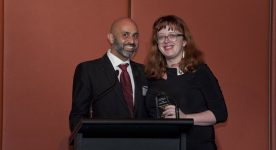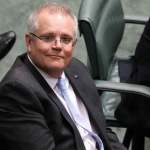Australia’s First Free Trans Legal Service: An Interview with ICLC’s Hilary Kincaid

Sydney’s Inner City Legal Centre (ICLC) launched Australia’s first pro bono transgender and gender diverse legal service on 10 September. The pilot Trans and Gender Diverse Legal Service will be operating once a fortnight in Kings Cross.
The ICLC has partnered with global law firm Dentons to provide the free legal advice and support service for all transgender and gender diverse people across NSW.
Those accessing the service will be able to seek advice on matters such as changes to identity documents, discrimination, transphobic violence and vilification, family law matters, as well as criminal matters and apprehended violence orders.
Last Monday was the pilot program’s second day of operations. And the service has already had quite a number of clients inquiring about a range of legal issues. The ICLC is hoping to officially launch the service in November in the same week as Transgender Remembrance Day.
A legal victory
On 30 November last year, the Full Family Court of Australia ruled that it’s no longer a requirement for an individual under the age of 18 to seek court approval for stage two treatment for gender dysphoria. This stage of treatment involves the administering hormones.
The ICLC represented the father of Kelvin who sought stage two treatment at the age of 16. Even though Kelvin had been given approval to start treatment in February last year, his father pressed ahead with the case as he believed the requirement to seek court approval should be abolished.
Prior to the court’s decision, Australia was the only country in the world that required court involvement in the decision to undertake this stage of treatment. And this issue was the main focus of the ICLC’s 2016 Trans Law Reform campaign.
Transgender rights
The Transgender and Gender Diverse Legal Service is an extension of the work the ICLC has been carrying out in the community for close to 40 years. The not-for-profit provides pro bono justice for vulnerable people, especially for members of the LGBTIQ community.
Transgender and gender diverse individuals are some of the most marginalised people in the Australian community. They often experience social isolation and high levels of violence. And they also have to deal with a range of legal challenges that specifically impact them.
Despite both federal and state anti-discrimination laws aimed at providing protections to transgender people being in place, the community still suffers widespread discrimination in employment, access to housing and education.
And while barriers still exist in this state for some trans people who want to alter the sex on their birth certificates, NSW finally passed laws so married transgender people don’t have to get a divorce in order to change their primary ID, which provided true marriage equality for those individuals.
Sydney Criminal Lawyers® spoke to Hilary Kincaid, principal solicitor at the Inner City Legal Centre, about the initial response to the trans legal service, the process involved in altering birth certificates and the impact the Re: Kelvin Family Court case ruling has had.
Firstly, Ms Kincaid, last Monday was the second day the fortnightly Trans and Gender Diverse Legal Service was open to see clients. What’s the response been like so far?
The response has been pretty steady. We had three appointments yesterday. And I believe four appointments in the first week. So, for a new service I’m quite pleased with that take up.
What sort of cases has the legal service been dealing with thus far? What are the issues that people have been fronting up about?
We had an appointment which was a pretty standard neighbour AVO dispute. But, one of the neighbours was using transphobic abuse towards our client. And we’ve had some appointments about change of name and change of sex on ID documents.
In the first week, we also gave advice about the law around accessing bathrooms. And I spent quite a bit of time talking about practical strategies to deal with conflict if she is challenged.
One of the major legal issues transgender people can face is changing the sex on their primary identity documents. How difficult a process is this in NSW?
In NSW, if you want to change the sex on your birth certificate, you have to have had a sex affirmation procedure, which I think is completely medieval, because many people don’t want to have this surgery.
How does that compare with the laws in other Australian jurisdictions?
The majority of other Australian states also require a sex affirmation procedure. The ACT changed its law about three years ago. And I believe South Australia has recently changed its law.
What sort of problems can arise for a transgender person whose gender doesn’t match their primary identification documents?
It can mean that they are forced to out themselves. So, if there is a discrepancy between the sex on their birth certificate and the name that they go by, then they essentially are forced to come out constantly as trans.
This has a significant effect on people’s privacy and people’s ability to avoid discrimination.
And on discrimination, that’s one of the major issues the Trans and Gender Diverse Legal Service will be assisting clients with.
In 1996, the Transgender Act was passed in this state. It amended the Anti-Discrimination Act, so as to make discrimination and vilification on transgender grounds unlawful.
How effective are these laws in protecting transgender people against discrimination?
The state laws could be more effective, because they rely quite heavily upon the idea of a recognised transgender person. And a recognised transgender person is someone who’s had surgery.
The better protection is in the Sex Discrimination Act, which is the federal legislation. It relies on gender identity and doesn’t require surgery to have taken place.
Your centre was involved in the Family Court case that saw the removal of the requirement for an individual under the age of 18 to seek court approval for stage two treatment for gender dysphoria. What sort of an impact has this ruling had?
We represented the father in that matter. And I’ll tell you a little story about it. On the day that the judgement came out, it came out at about 12 o’clock. And it was emailed to me at 12:15.
I got a call from a client at 2 o’clock, saying, “I’m standing outside a pharmacy. Can I go in and get my son a prescription for testosterone pills?”
And I said, “Yes you can.”
It was a pretty amazing example of the law working very quickly.
Practically, for us, it meant that we closed about 20 cases where we had court applications that we were preparing because the law changed.
It now means that these young people can get treatment without having the stress and anxiety of the court application.
There is one area where the law is still a bit unclear. The case last year didn’t relate to surgery. So, it didn’t include things like top surgery.
We filed an application earlier this year on behalf of a young person that wanted to have top surgery. And that was dismissed by the court on the basis that because it was therapeutic there was no need for us to come to court.
But, that was just the decision of a single judge, so it isn’t authoritative in the way that the full court decision was.
Dentons is the largest law firm in the world. How did it come to be that the Inner City Legal Centre paired up with this multinational firm on this initiative?
They approached us six months to a year ago and expressed that they were interested in working jointly in something to help transgender people.
And lastly, Ms Kincaid, looking at the response to your new service over recent weeks, do you see a need for an expansion of this type of service around the country?
We’ve had a number of queries from out of state. We’re helping with those queries by giving them referrals. But otherwise, I’m keeping track of them to identify more.
In the long term it is certainly possible that we would expand to include other states as well.







